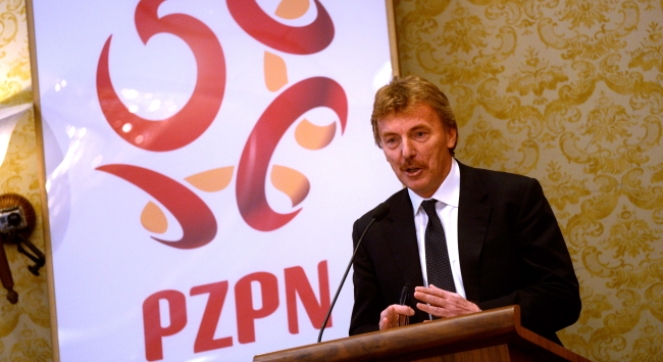
Zbigniew Boniek at PZPN convention: below, outgoing president Grzegorz Lato: photos PAP/Bartłomiej Zborowski
Boniek, who played for the Polish national side 80 times in a glittering career, beat four other candidates standing in the elections in Warsaw, Friday, at the PZPN's General Assembly, for a post that carries a much higher status in Poland than in many other footballing nations.
This is the second time the 56 year-old, who had a distinguished club career including a stint at Juventus in Italy, has stood for the position of Polish football chief.
Boniek, who is known to be a close friend of UEFA boss Michel Platini, picked up 45 votes in the first ballot and a decisive 61 votes in the second from the 118 delegates.
The election is seen as crucial for the future of Poland's international and domestic game, after disappointment at the Euro 2012 football championships and what has been seen by many, including the Polish government, as a failure of management over the last four years under the presidency of former Polish football international star, Grzegorz Lato.
The four other candidates for the post were President of the Wielkopolska football association Stefan Antkowiak, former international and Platform MP Roman Kosecki, former PZPN secretary-general Zdzislaw Kręcina and President of the Lodz FA, Edward Potok.
Meanwhile, Sport Minister Joanna Mucha said on Friday that possible changes to the management at the National Sports Centre would be announced on Monday, following the flooded pitch fiasco at the Poland versus England World Cup qualifying match which caused the game to be postponed by one day.
Successes and own goals
Earlier, the outgoing PZPN president Grzegorz Lato – who did not receive the required amount of supporting signatures to run again as a candidate – told delegates that during his four years in the job there were some successes but "there were also failures, which must be taken into account”.
Among those successes was the organisation of the Euro 2012 football championships, co-hosted this summer by Poland and Ukraine, which [Michel] Platini [president of UEFA] gave the highest possible ratings," he said.
Of the poor performance on the pitch by the Polish side – which failed to win a single match, came bottom of Group A and failed to qualify for the knock out part of the Euro 2012 tournament, Lato said: “"Believe me, that team had everything it needed. If we had won one match in that group, the mood would be completely different today."
Lato – who was one of Poland's top football stars in the successful Polish team of the 1970s – said there were grounds for optimism for the future, as new coach of the national side, Waldemar Fornalik, has brought some improvements and “chances of qualifying for the 2014 World Cup finals in Brazil are real”.
“Thank you to those who supported me and worked with me for four years. I wish you a successful election for a new president and all the best to my successor," Grzegorz Lato said, at the end his final speech as president of PZPN.
Tactics
Rumours of alliances and tactical voting blocs being formed and broken apart spread through out the 118 delegates attending the convention at the Sheraton Hotel in Warsaw since the conference got under way at 10 am this morning.
It was said that deals were being made between supporters of Kosecki and Potok in particular, with promises of support of one or the other failed in the first round of voting, the Polish Press Agency (PAP) reported.
One of the weakest candidates was Zdzislaw Kręcina, who had to resign his post as secretary-general after he featured in video tapes that emerged late last year allegedly showing corrupt dealings connected to the building of the new PZPN HQ building.
Candidates' supporters were said to be urging Kręcina to stand down before the election and recommend his votes go to their men.
The rules of the election resembled that of electing a head of state, where a first round win required a candidate to secure 50 percent of the votes plus one.
If no candidate received that amount then a second round would go ahead with the candidate coming last in the first round dropping out, leaving just four left in the race.
The winning candidate in the second round was the one who gained the most votes. (pg)
source: IAR/PAP